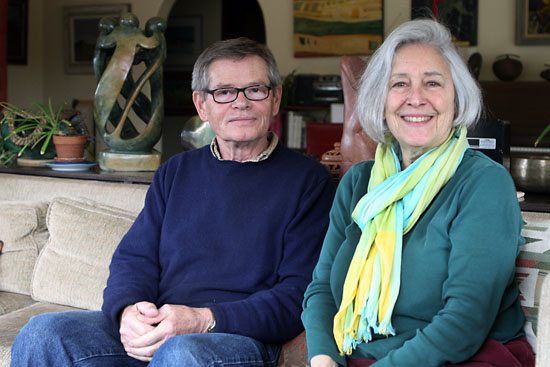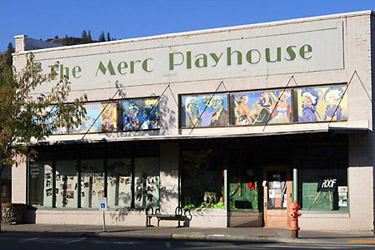home | internet service | web design | business directory | bulletin board | advertise | events calendar | contact | weather | cams

|
Hardware Theatre The extraordinary acoustics in Twisp’s old Mercantile building first came to the attention of Carolanne and Egon Steinebach in 1994, when the store was having its closing sale.  Egon and Carolanne Steinebach founded The Merc Playhouse after noticing the great acoustics in the former hardware store. Egon and Carolanne Steinebach founded The Merc Playhouse after noticing the great acoustics in the former hardware store.
The couple was visiting from Vancouver, B.C., and wandered into the nearly empty hardware store, built in 1924, to see if anything was left to purchase, Carolanne recalls. Finding an interesting item, she said something about it to Egon, thinking he was standing right behind her. He’d moved to a different part of the store, but he clearly heard her, even though her back was to him. And she distinctly heard his reply from across the room. They immediately realized: “Wow! The acoustics! You can talk in a normal voice and be heard anywhere in the building,” recalls Carolanne. “I walked right out the door and across the street and up the stairs to the Methow Arts Alliance and spoke to (executive director) Laura Fine.” She told Fine that the Merc would make a great performance venue and urged that the alliance take it on. “Why don’t you buy it?” Fine responded. “I don’t live here! Come on!” Carolanne replied, and that was the end of that. But when she and Egon moved to Twisp in 1997, the building was for sale; it had stood empty for four years. Carolanne had experience running a professional theatre in Vancouver, and they decided to buy the building. “I thought it would be the Methow Valley Theatre,” says Carolanne, 69, who adds that she didn’t want to be in competition with the existing community theatre group. “I offered it to the Methow Valley Theatre and they turned it down.” So the Steinebachs decided to start a non-profit professional theatre. Egon, a draftsman, professional photographer and theatre lighting technician, spent a year converting the store to a theatre. The Merc Playhouse formally opened as a professional theatre in 1999 with Carolanne as the artistic director who also occasionally performed as an actress. Aside from the standard fee when she directed, or acted in, a play, her artistic director and the couple’s administrative and other services were donated. The building was leased from its inception as a non-profit professional theatre by the Steinebachs to The Merc Playhouse for $1 a year, with the exception of the last eight months, when the theatre paid them $800 per month rent, says Carolanne. “I think a lot of men don’t go to the theatre because it’s too intimate,” Egon observes. Nonetheless, he was of the opinion that if you build it, they will come. “We always wanted to do theatre,” he says. And for more than a decade, the Steinebachs did just that, bringing professional actors to perform before appreciative audiences.  The Merc first opened as a professional theatre in 1999. The Merc first opened as a professional theatre in 1999.
On April 16, ownership of the building passed from the Steinebachs to The Merc Playhouse. And rather than remain a professional theatre, it will become a community theatre. “I’m thrilled it’s staying a theatre space,” says Carolanne, who adds that she did not know its mission would change from a professional to community theatre. But she says she understands that the change makes financial sense. Because The Merc Playhouse had to pay actors to perform, the theatre barely broke even most years, she says. “We’re really gratified that the Merc is still a going thing. That’s the most important thing.” Carolanne was raised in New York City and attended the prestigious Brearley School for girls at the same time as another woman from the Big Apple who also improbably found her way to the theatre scene in Twisp, Jane Pappidas, now vice president of the theatre’s board of directors. “I actually remember Jane on stage. She had a great voice,” Carolanne recalls of their school days; she even has a prized autograph from Pappidas, an admired upperclassman, in her school yearbook. The two former schoolmates co-starred in a Merc production of “Lettice and Lovage” in 2008. Carolanne, who says she was raised as a secular humanist in a non-observant Jewish family, obtained a degree in French at the University of Colorado in Boulder and married a Canadian citizen, a teacher with whom she had two sons. The family lived in Winnepeg, then moved to Vancouver, B.C., where she got a master’s degree in library science and worked as a librarian. Early on, she had worked as a dancer in New York. Though she studied acting after she stopped dancing “because of age,” Carolanne says her real interest lay in directing. “I had discovered that I was able to envision what should be on a stage from a writer’s script,” she explains. “I didn’t know other people couldn’t do that.” “I was always attracted to the West,” she says when asked how she came to the Methow. “It was my nature to be out in nature.” In 1973 the Vancouver-based family bought property up the Rendezvous and built a log cabin, where they spent summers. That marriage ended in divorce. She and Egon, who has five children from two earlier marriages, met during theatre work in Vancouver. Born in Germany in 1940, Egon emigrated to Canada in 1957 with his family. “We didn’t go to the States because they had a draft,” he says. But first they endured a harrowing escape from the Soviet sector of Germany. Egon’s father Franz was a Catholic educated by the Jesuits to become a priest, likely because his mother appears to have been half Jewish and the family was anxious to demonstrate its Christian credentials, according to Egon. Franz instead became a professional violinist and engineer who found himself testing airplane engines 12 hours a day as a civilian working for Hitler’s Third Reich in Dessau. The town was almost completely destroyed by allied bombing in 1945, and Egon recalls spending his formative years in bomb shelters. American soldiers were the first to enter Dessau after the war, and they picked Franz up off the street and sent him to an open-air prisoner of war camp with 50,000 other inmates on a hill under the radio tower in Koblenz, his ancestral home. Meanwhile his family in Dessau had no idea what had happened to him. Someone in the camp stole Franz’s pants when he’d hung them out to dry after washing them, so he lived much of his incarceration in just his long underwear. But in one of those stranger-than-fiction occurrences, he was released after six months. When Franz was 10 years old, he was in the habit of stealing empty wine bottles from the Jewish family next door so he could collect the glass refund. One day a relative of the Jewish family who was visiting from America caught Franz in the act and gave him a proper thrashing. As luck would have it, one of the American officers in the prison camp turned out to be the very man who’d given Franz the beating years earlier. When they met, the officer recognized the troublesome bottle thief and saw to it that he was set free. Franz returned to Dessau, which had passed into Soviet hands, and went back to work in his own laboratory, this time for the Russians, who ordered him to dismantle it. “My father was a weird man,” Egon chuckles. With everything laying in ruins about him, he nevertheless insisted on having tropical fish. One day in 1946 Franz was forewarned by a Soviet officer friend that the Russians were about to send him away to work in the Soviet Union. Franz had six children, the oldest of whom he’d secretly sent away during the war to keep her out of the Hitler Youth. For her part, Egon’s mother had received a gold mothers’ cross from the Fuhrer for her diligence in producing Germans. Egon relates that when a Nazi officer showed up at the front door to deliver the commendation, she duly accepted it, but rather than invite him in for coffee as was the custom, she promptly shut the door in his face. Later, when they were hungry, they traded the Fuhrer’s commendation for a tall stack of big pancakes from a U.S. Army field mess kitchen, Egon recalls. When the warning came of their impending deportation to Russia, Franz decided they would escape from the Soviet sector just before Christmas and return to Koblenz, where his parents still lived. They were among 17 million Germans who made the same post-war decision to flee what would become East Germany, says Egon. “God, it was a terrible trip,” he recalls. A train ride that was supposed to take two hours took 17, in a train with all the windows blown out and so tightly packed that some passengers had to stand the entire journey. The fuel used for locomotion sent sparks into the compartments, so people wrapped themselves in wet blankets to keep their clothing from catching fire. At one train stop, six-year-old Egon took it upon himself to wander off to beg for food. He’d learned to sing a little song to win people over, and he scored some rolls. But he became lost. His distraught family went searching for him, thus quite by happenstance managing to miss being rounded up and sent back by a passing patrol. His family scolded him angrily when they finally were reunited. Still, he smiles ruefully, “They ate the rolls.” When Egon’s parents and their five children finally arrived at the border crossing into the English sector, they found one lone young Russian soldier manning a machine gun on duty at the station, where a boom across the footpath barred entry into No Man’s Land. “My father tried to bribe him, but he wouldn’t take it,” says Egon, who still tears up at the memory. Instead, the soldier raised the boom and told them to run for it. His clear duty was to stop them from escaping. But, Egon says, “He didn’t have the heart.” 4/18/2012 Comments read more feature stories in the archive >> |